Tips For Making Your Pool Eco-Friendly And Wildlife-Friendly
In today’s world, creating an eco-friendly backyard is more important than ever. Not only does it benefit the environment, but it can also enhance your pool experience by inviting local wildlife and creating a harmonious outdoor space. At Fibreglass Pools Melbourne, we believe that enjoying your pool doesn’t have to come at the expense of nature. Here are some practical tips for making your pool area eco-friendly and wildlife-friendly, turning your backyard into a sustainable oasis.
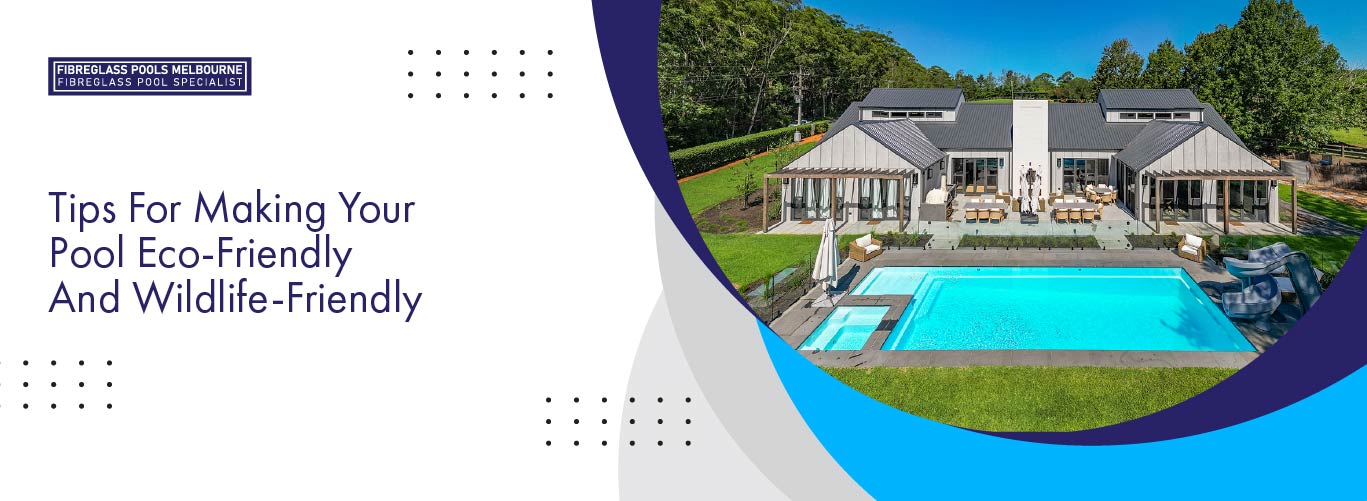
1. Opt for Energy-Efficient Pool Equipment
Investing in energy-efficient equipment can significantly reduce your pool’s environmental impact:
- Variable-Speed Pool Pumps: These pumps use less energy compared to traditional pumps by allowing you to adjust the speed based on your needs. They can save you a significant amount on your electricity bill and help reduce your carbon footprint.
- LED Pool Lighting: Replace old incandescent lights with energy-efficient LED lights. They not only use less energy but also last longer, reducing the need for replacements.
- Solar Pool Heaters: Harness the power of the sun to keep your pool warm. Solar heaters are an environmentally friendly option that can significantly reduce your reliance on gas or electric heaters.
2. Use Eco-Friendly Pool Chemicals
Choosing the right pool chemicals can help minimise your impact on the environment:
- Natural Alternatives: Consider using saltwater chlorination systems or natural sanitizers like mineral systems that use fewer harsh chemicals than traditional chlorine. This not only benefits your pool but also the surrounding wildlife.
- Eco-Friendly Cleaners: Opt for biodegradable and non-toxic cleaners when maintaining your pool. These products are less harmful to aquatic life and the environment, making your cleaning routine more sustainable.
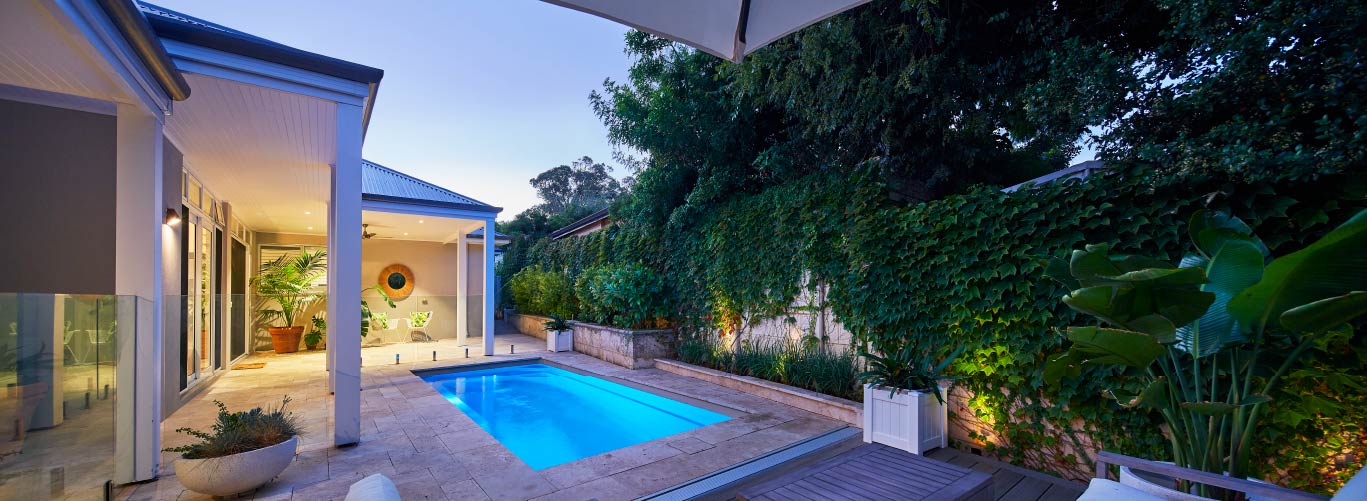
3. Optimise Water Usage
Water conservation is crucial for any eco-friendly pool:
- Pool Covers: Use a pool cover when your pool is not in use to reduce evaporation. This simple step can save a significant amount of water and help maintain your pool’s temperature.
- Regular Maintenance: Ensure your pool is regularly maintained to prevent leaks. Even small leaks can waste hundreds of litres of water over time, so keep an eye out for any signs of water loss.
- Water-Efficient Features: Consider installing features like fountains or waterfalls that recycle water. These features can create a beautiful ambiance while minimising water wastage.
4. Create a Wildlife-Friendly Environment
Encouraging wildlife to visit your backyard can enhance your pool experience and help support local ecosystems:
- Native Plants: Plant native vegetation around your pool area. Native plants require less water and maintenance, provide food and habitat for local wildlife, and create a beautiful natural landscape.
- Pollinator Gardens: Create a pollinator garden with flowers that attract bees, butterflies, and other beneficial insects. These gardens can enhance biodiversity and contribute to a healthier ecosystem.
- Wildlife Shelters: Consider adding birdhouses, bat boxes, or insect hotels nearby. These structures provide habitats for wildlife, allowing you to enjoy nature while keeping your pool area vibrant and lively.
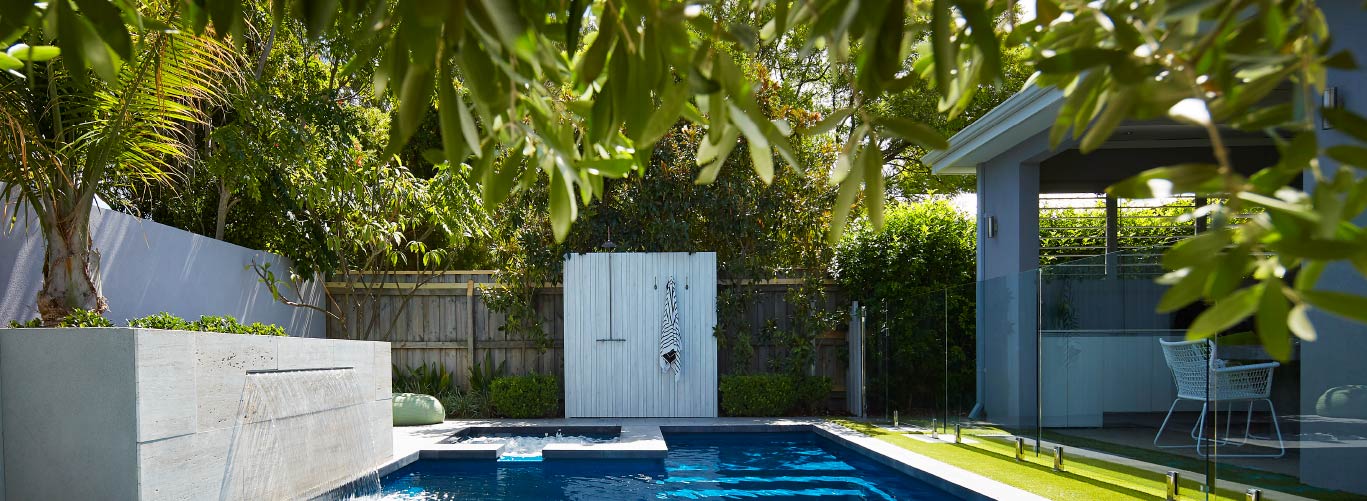
5. Design for Natural Aesthetics
When planning your pool area, focus on designs that blend with the environment:
- Natural Rock Features: Incorporate rocks, boulders, and natural elements around your pool to create a seamless transition between your pool and the surrounding landscape. This approach not only looks great but also supports local wildlife habitats.
- Native Hardscaping: Use permeable materials for pathways and patios to allow rainwater to soak into the ground, replenishing local aquifers and reducing runoff.
6. Educate Your Family and Guests
Share your commitment to sustainability with family and friends:
- Awareness: Educate your family and guests about the importance of eco-friendly practices. Encourage them to respect local wildlife and the environment while enjoying your pool area.
- Activities: Organise poolside activities like nature walks or wildlife watching to engage your guests and highlight the beauty of the natural world around you.
Creating an eco-friendly and wildlife-friendly pool doesn’t just benefit the environment; it also enhances your enjoyment of your outdoor space. By incorporating energy-efficient equipment, using eco-friendly products, conserving water, and fostering a wildlife-friendly atmosphere, you can enjoy your pool while caring for the planet.
Tips For Making Your Pool Eco-Friendly And Wildlife-Friendly
In today’s world, creating an eco-friendly backyard is more important than ever. Not only does it benefit the environment, but it can also enhance your pool experience by inviting local wildlife and creating a harmonious outdoor space. At Fibreglass Pools Melbourne, we believe that enjoying your pool doesn’t have to come at the expense of nature. Here are some practical tips for making your pool area eco-friendly and wildlife-friendly, turning your backyard into a sustainable oasis.
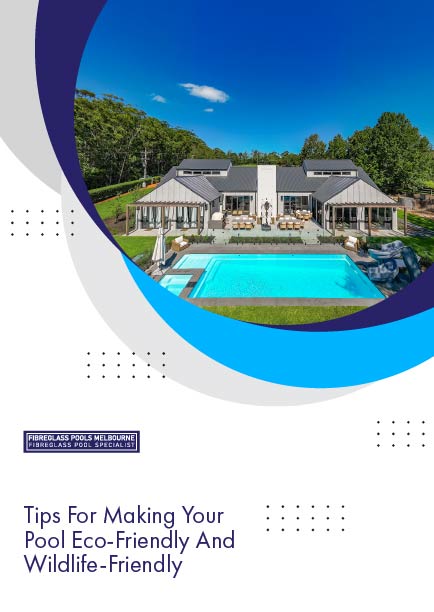
1. Opt for Energy-Efficient Pool Equipment
Investing in energy-efficient equipment can significantly reduce your pool’s environmental impact:
- Variable-Speed Pool Pumps: These pumps use less energy compared to traditional pumps by allowing you to adjust the speed based on your needs. They can save you a significant amount on your electricity bill and help reduce your carbon footprint.
- LED Pool Lighting: Replace old incandescent lights with energy-efficient LED lights. They not only use less energy but also last longer, reducing the need for replacements.
- Solar Pool Heaters: Harness the power of the sun to keep your pool warm. Solar heaters are an environmentally friendly option that can significantly reduce your reliance on gas or electric heaters.
2. Use Eco-Friendly Pool Chemicals
Choosing the right pool chemicals can help minimise your impact on the environment:
- Natural Alternatives: Consider using saltwater chlorination systems or natural sanitizers like mineral systems that use fewer harsh chemicals than traditional chlorine. This not only benefits your pool but also the surrounding wildlife.
- Eco-Friendly Cleaners: Opt for biodegradable and non-toxic cleaners when maintaining your pool. These products are less harmful to aquatic life and the environment, making your cleaning routine more sustainable.
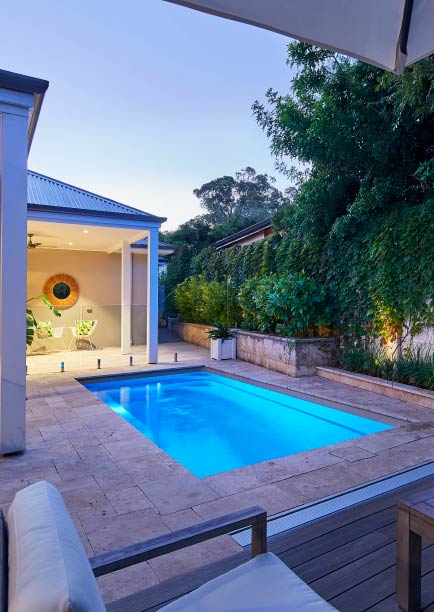
3. Optimise Water Usage
Water conservation is crucial for any eco-friendly pool:
- Pool Covers: Use a pool cover when your pool is not in use to reduce evaporation. This simple step can save a significant amount of water and help maintain your pool’s temperature.
- Regular Maintenance: Ensure your pool is regularly maintained to prevent leaks. Even small leaks can waste hundreds of litres of water over time, so keep an eye out for any signs of water loss.
- Water-Efficient Features: Consider installing features like fountains or waterfalls that recycle water. These features can create a beautiful ambiance while minimising water wastage.
4. Create a Wildlife-Friendly Environment
Encouraging wildlife to visit your backyard can enhance your pool experience and help support local ecosystems:
- Native Plants: Plant native vegetation around your pool area. Native plants require less water and maintenance, provide food and habitat for local wildlife, and create a beautiful natural landscape.
- Pollinator Gardens: Create a pollinator garden with flowers that attract bees, butterflies, and other beneficial insects. These gardens can enhance biodiversity and contribute to a healthier ecosystem.
- Wildlife Shelters: Consider adding birdhouses, bat boxes, or insect hotels nearby. These structures provide habitats for wildlife, allowing you to enjoy nature while keeping your pool area vibrant and lively.
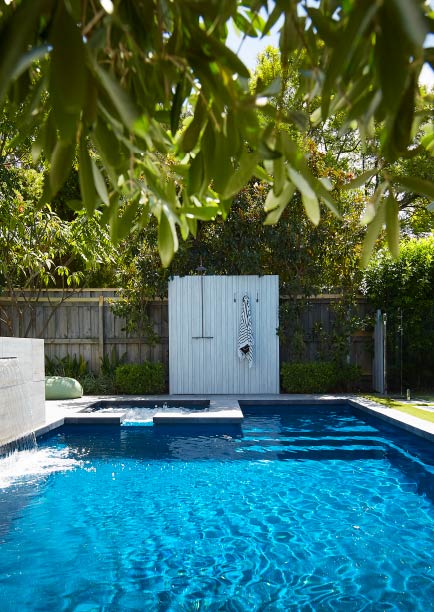
5. Design for Natural Aesthetics
When planning your pool area, focus on designs that blend with the environment:
- Natural Rock Features: Incorporate rocks, boulders, and natural elements around your pool to create a seamless transition between your pool and the surrounding landscape. This approach not only looks great but also supports local wildlife habitats.
- Native Hardscaping: Use permeable materials for pathways and patios to allow rainwater to soak into the ground, replenishing local aquifers and reducing runoff.
6. Educate Your Family and Guests
Share your commitment to sustainability with family and friends:
- Awareness: Educate your family and guests about the importance of eco-friendly practices. Encourage them to respect local wildlife and the environment while enjoying your pool area.
- Activities: Organise poolside activities like nature walks or wildlife watching to engage your guests and highlight the beauty of the natural world around you.
Creating an eco-friendly and wildlife-friendly pool doesn’t just benefit the environment; it also enhances your enjoyment of your outdoor space. By incorporating energy-efficient equipment, using eco-friendly products, conserving water, and fostering a wildlife-friendly atmosphere, you can enjoy your pool while caring for the planet.


